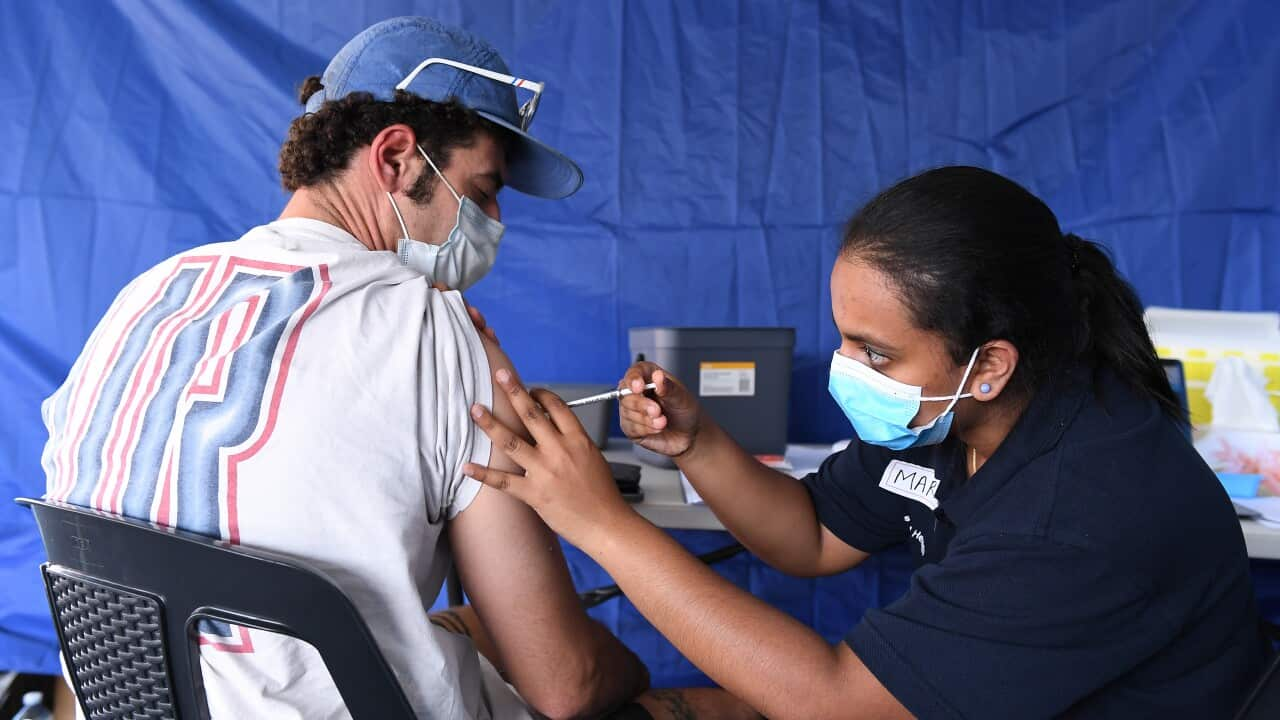Key Points
- It is estimated about one in 10 Australians have never had COVID-19.
- Three Australians share their experience of avoiding the virus.
- Researchers are looking into genetics and cross-immunity in regard to why some people haven't been infected.
They are known as "NOVIDs" — the people who've managed to evade contracting COVID-19 three years into the pandemic.
It is estimated about one in 10 Australians may fall into this category, although experts admit the exact number of people who are yet to have contracted COVID is unknown.
How many Australians have never had COVID?
Adrian Esterman, Chair of Biostatistics and Epidemiology at the University of South Australia, believes about 10 per cent of the adult population has never had COVID.
He based his estimate on the most recent serology reports done by the Kirby Institute and the National Centre for Immunisation Research and Surveillance.
“They get blood samples usually from the Red Cross, and they check them to see who's got antibodies against the virus, which could only have been gotten from being infected,” Professor Esterman told SBS News.
“The last report was in November, and they found 70 per cent of the adult population had been infected.”
He estimates that number would have risen to somewhere around 90 per cent today.
The frequent traveller
Lawyer Phillip Schubert lives with his partner in Canberra when he's not travelling to Hobart for work. Both have so far managed to avoid getting a positive COVID test.
Mr Schubert said while he followed all of the COVID restrictions when they were in place, he's since said goodbye to his mask and has recently enjoyed being part of social gatherings again.

The World Health Organisation has declared "COVID-19 over as a global health emergency". Source: Getty / Rawf8
“I’ve sat on so many planes and thought, is this the time I’ll get it? But luckily not,” he said.
Mr Schubert admitted it was possible he may have contracted the virus without having serious symptoms.
Like the other NOVIDs that SBS News spoke to, Mr Schubert was fully vaccinated but said it was probably “weird blind luck” that he had not contracted the virus.
The multi-vaccinated
Christine Brooks, a 62-year-old Geelong resident, is a NOVID.
She does not have any children in her household, works part-time in a small office and worked from home for a period.

Christine Brooks from Geelong understands a level of luck has helped her avoid COVID, saying her risk was probably reduced due to her quieter lifestyle. Source: Supplied
Ms Brooks admits living by herself was also probably a factor.
Professor Esterman said children were often the ones who brought the virus home from childcare or school.
“There must be vast numbers of people who pick it up from their children, unfortunately,” he said.
The socially-cautious
Shakira Hussein from Melbourne has been very careful about where she goes, who she sees and in what settings.
Having multiple sclerosis means she is at a higher risk of severe illness if she were to contract the virus.

Ms Hussein believes being extra cautious has played a role in her avoiding COVID-19. Source: Twitter
“I had thought 2020 was going to be the year I’d take on the world again,” she said.
Instead her self-enforced isolation has continued into 2023 in many ways.
"I have a sort of hierarchy, which might sound really mean, but it's about, who do I care about? Who do I meet outdoors? And also, who cares about me enough? Who do I feel confident with being mindful enough of my health?”
While Ms Hussein believes being extra cautious has played a role in her avoiding COVID, she said she understood others had been even more careful and still contracted the virus.
She has taken two overseas trips in recent years, one to the United Kingdom to see family when an uncle died from COVID and one to New Zealand for work.
How have NOVIDs avoided the virus?
While certain factors may reduce the risk of contracting COVID, Professor Esterman said it was unclear why some people managed to evade COVID.
“There could be genetics at play," he said.
"We know some people have got a genetic profile that makes them resistant to HIV, for example. There are studies around the world now to try and find out if people that have a particular combination of genes that might cause reason for it, but we don't know yet."

Adrian Esterman, Chair of Biostatistics and Epidemiology at the University of South Australia said serology reports were the best indicator of how many people have had COVID-19. Source: Supplied
“We know that about 40 per cent of common colds are caused by coronaviruses [other than COVID-19]. It could be that if you had a recent cold, you get some sort of cross-immunity.”
Professor Esterman pointed to the fact that most children who get COVID-19 did not get seriously ill.
"Young children have always got snotty noses and got coughs and colds and it could well be that that's giving them some protection,” he said
He said while vaccinations protect people against serious illness and death “extremely well", they currently gave little protection against infection.
He said it was therefore possible that some people who considered themselves to have never had COVID, may have actually have had it without being symptomatic and realising.
The longer a person could hold off contracting COVID, the better, he said.
“The longer you can be without being infected, the better chance of new antivirals and vaccines. All of these are being developed as we speak."
Professor Esterman has himself not yet had COVID.
“If I can spend the next 12 months without getting it, there's a chance that even if I did get it I’d have much better treatment options," he said.










